Ford Fiesta vs hatchback rivals
Britain’s best-selling car is back and even better. How does the Ford Fiesta compare to the VW Polo, SEAT Ibiza and others?
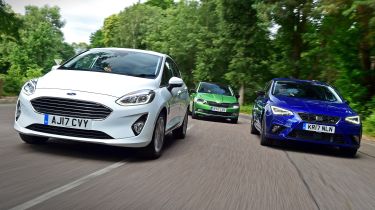
The Ford Fiesta supermini is the UK’s most popular car - look outside your window and the chances are you will even see one parked on your street. When a new one arrives it’s big news, compelling many owners of the old model to upgrade and manufacturers to make sure their rivals are even better.
Ford certainly hasn’t taken any risks with its most important model, ensuring it matches any other supermini for style. There are big improvements in every area over the previous model, from the interior design to in-car technology and safety. The range spans the entry-level Style model, Zetec, Titanium, B&O Play editions and the luxurious Vignale, plus the Fiesta Active crossover and Fiesta ST hot hatchback.
Best small cars and superminis
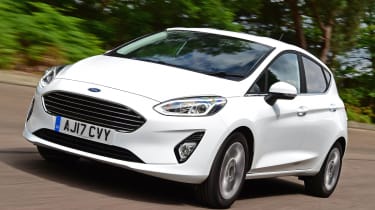
The Fiesta is by no means the only excellent small car on sale. The European class is one of the most competitive in the world, with the Fiesta launch bookended by the arrival of up against a suite of high-quality alternatives such as the latest SEAT Ibiza and the Volkswagen Polo. We’ve still barely scratched the surface, as you could also consider the practical Skoda Fabia, Hyundai i20, Honda Jazz or Kia Rio.
Ford Fiesta interior
Offering a very sophisticated and tech-filled interior, the Fiesta is more than a match for the Ibiza, Polo and Mazda 2. Almost all versions feature a touchscreen infotainment system with DAB radio, Apple CarPlay and Android Auto, which makes choosing your favourite playlist a breeze. More expensive trim levels even offer sat nav, a reversing camera and heated front seats, but all include electric windows, air conditioning and Bluetooth connectivity.
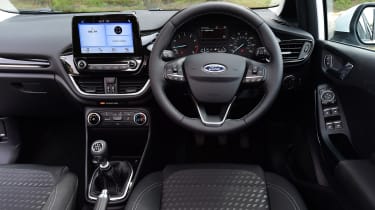
Build quality is now almost as good as the three cars listed above, which will hopefully mean that rattles and squeaks are kept to a minimum during ownership.
Ford Fiesta practicality
Cars tend to grow over time, as a new model usually offers more space than the outgoing version. For customers this is good news because superminis are now more practical than ever, yet still just as affordable.
In terms of boot space the Fiesta is practical but not class-leading, with 292 litres of loading volume behind the rear seats. That matches the Hyundai i20 and is more than the Mazda 2 offers. However, the SEAT Ibiza has gone straight to the top here, with a huge 355 litres of space - within a whisker of the new Ford Focus, a much larger car. The Polo is almost as good with 350 litres, followed by the Skoda Fabia with 330.
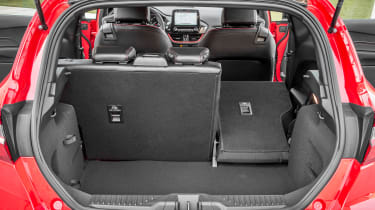
Sitting in the back of the Ford is now much easier, with 16mm more knee room than the old Fiesta. The designers have made the front seats much thinner than before, so there’s more space for adults to sit in the back, while those sitting in the front are just as comfortable as ever. The driving position can be adjusted with the seat and steering wheel, making it easy to find an ideal spot.
The SEAT Ibiza, Volkswagen Polo and Skoda Fabia feel just as roomy, but the Fiesta is now more than a match for its rivals.
Ford Fiesta petrol fuel economy
The award-winning 1.0-litre EcoBoost engine with 99bhp is the Fiesta’s most economical petrol engine, returning a claimed 50.4mpg and emitting 110g/km of CO2. This will make it popular with businesses (thanks to its 23% company-car tax rating) and private buyers alike.
Its economy is very impressive, and is just a hair’s breadth short of the Ibiza and Polo. They achieve a claimed 53.3mpg and 52.3mpg respectively, but you are unlikely to notice a big difference in real driving.
Ford Fiesta diesel fuel economy
For the most economical Fiesta, look no further than the 1.5-litre diesel with 84bhp. It can return 60.1mpg in mixed driving - more than some hybrid models - and emits just 96g/km of CO2 for a 26% BiK company-car tax rating.
The Ibiza matches the Fiesta’s official MPG figure, but neither it nor the Polo can creep below the 100g/km mark for CO2 emissions.
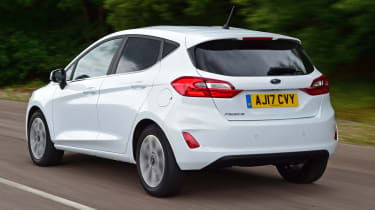
Insurance groups
The Ford Fiesta starts in insurance group five, which should be very affordable, but this only includes the 1.1-litre petrol engine. Choose the diesel and this goes up to group eight, with the 1.0-litre petrol with 99bhp two groups higher still. The SEAT Ibiza starts from group five, but sporty FR models can also be a lot higher, with groups of up to 15 possible. The Skoda Fabia is available with group three insurance and the entry-level Kia Rio diesel is in group four.
Warranty
When you are buying a new car, you want to feel reassured any niggles or faults will be taken care of. In this respect, the Fiesta only comes with a mediocre length of warranty, which should be fine if you are in a leasing deal or change your car regularly, but may not be ideal if you plan to own your new supermini for an extended period.
The Fiesta’s warranty lasts for three years or 60,000 miles, matching the SEAT Ibiza, Skoda Fabia, Vauxhall Corsa and Volkswagen Polo. But, choose a Renault Clio and the warranty lasts four years or 100,000 miles, while a Toyota Yaris and Hyundai i20 are both covered for five years or 100,000 miles. For long-term owners the Kia Rio is even more appealing, because its warranty covers the car for seven years or 100,000 miles and can even be transferred to the next owner within that period, boosting its appeal as a used car.
Recommended
Most Popular
Tips & advice

Car dashboard warning lights: what does each symbol mean?

Electric car charging stations: public networks, charger types, apps and maps







